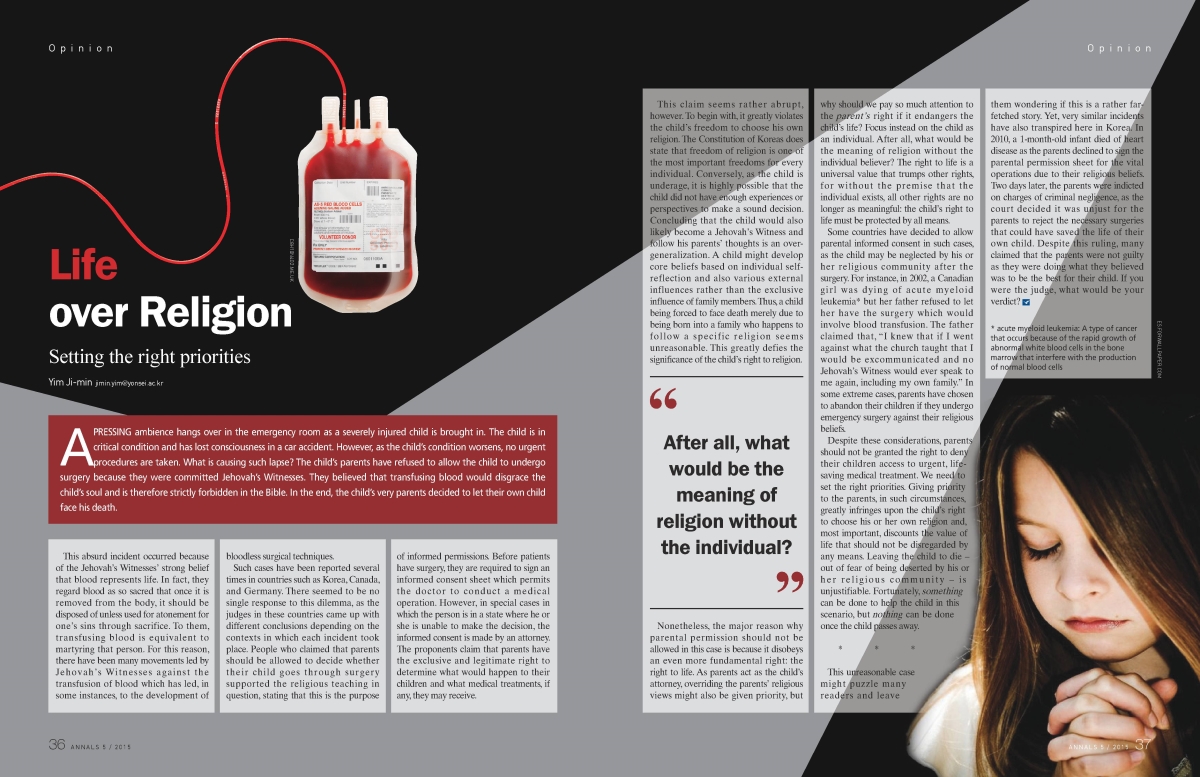Setting the right priorities


A PRESSING ambience hangs over in the emergency room as a severely injured child is brought in. The child is in critical condition and has lost consciousness in a car accident. However, asthe child’s condition worsens, no urgent procedures are taken. What is causing such lapse? The child’s parents have refused to allowthe child to undergo surgery because they were committed Jehovah’s Witnesses. They believed that transfusing blood would disgrace the child’s soul and is therefore strictly forbidden in the Bible. In the end, the child’s very parents decided to let their own child face his death.
This absurd incident occurred because of the Jehovah’s Witnesses’ strong belief that blood represents life. In fact, they regard blood as so sacred that once it is removed from the body, it should be disposed of unless used for atonement for one’s sins through sacrifice. To them, transfusing blood is equivalent to martyring that person. For this reason, there have been many movements led by Jehovah’s Witnesses against the transfusion of blood which has led, in some instances, to the development of bloodless surgical techniques.
Such cases have been reported several times in countries such as Korea, Canada, and Germany. There seemed to be no single response to this dilemma, as the judges in these countries came up with different conclusions depending on the contexts in which each incident took place. People who claimed that parents should be allowed to decide whether their child goes through surgery supported the religious teaching in question, stating that this is the purpose of informed permissions. Before patients have surgery, they are required to sign an informed consent sheet which permits the doctor to conduct a medical operation. However, in special cases in which the person is in a state where he or she is unable to make the decision, the informed consent is made by an attorney. The proponents claim that parents have the exclusive and legitimateright to determine what would happen to their children and what medical treatments, if any, they may receive.
This claim seems rather abrupt, however. To begin with, it greatly violates the child’s freedom to choose his own religion. The Constitution of Koreas does state that freedom of religion is one of the most important freedoms for every individual. Conversely, as the child is underage, it is highly possible that the child did not have enough experiences or perspectives to make a sound decision. Concluding that the child would also likely become a Jehovah’s Witness and follow his parents’ thoughts is an over-generalization. A child might develop core beliefs based on individual self-reflection and also various external influences rather than the exclusive influence of family members. Thus, a child being forced to face death merely due to being born into a family who happens to follow a specific religion seems unreasonable. This greatly defies the significance of the child’s right to religion.
Nonetheless, the major reason why parental permission should not be allowed in this case is because it disobeys an even more fundamental right: the right to life. As parents act as the child’s attorney, overridingthe parents’ religious views might also be given priority, but why should we pay so much attention to the parent’s right if it endangers the child’s life? Focus instead on the child as an individual. After all, what would be the meaning of religion without the individual believer? The right to life is a universal value that trumps other rights, for without the premise that the individual exists, all other rights are no longer as meaningful: the child’s right to life must be protected by all means.
Some countries have decided to allow parental informed consent in such cases, as the child may be neglected by his or her religious community after the surgery. For instance, in 2002, a Canadian girl was dying of acute myeloid leukemia* but her father refused to let her have the surgery which would involve blood transfusion. The father claimed that, “I knew that if I went against what the church taught that I would be excommunicated and no Jehovah’s Witness would ever speak to me again, including my own family.” Insome extreme cases, parents have chosen to abandon their children if they undergo emergency surgery against their religious beliefs.
Despite these considerations, parents should not be granted the right to deny their children access to urgent, life-saving medical treatment. We need to set the right priorities. Giving priority to the parents, in such circumstances, greatly infringes upon the child’s right to choose his or her own religion and, most important, discounts the value of life that should not be disregarded by any means. Leaving the child to die – out of fear of being deserted by his or her religious community – is unjustifiable. Fortunately, something can be done to help the child in this scenario, but nothing can be done once the child passes away.
* * *
This unreasonable case might puzzle many readers and leave them wondering if this is a rather far-fetched story. Yet, very similar incidents have also transpired here in Korea. In 2010, a 1-month-old infant died of heart disease as the parents declined to sign the parental permission sheet for the vital operations due to their religious beliefs. Two days later, the parents were indicted on charges of criminal negligence, as the court decided it was unjust for the parents to reject the necessary surgeries that could have saved the life of their own child. Despite this ruling, many claimed that the parents were not guilty as they were doing what they believed was to be the best for their child. If you were the judge, what would be your verdict?
*acute myeloid leukemia: A type of cancer that occurs because of the rapid growth of abnormal white blood cells in the bone marrow that interfere with the production of normal blood cells
Yim Ji-min
jiminyim@yonsei.ac.kr

